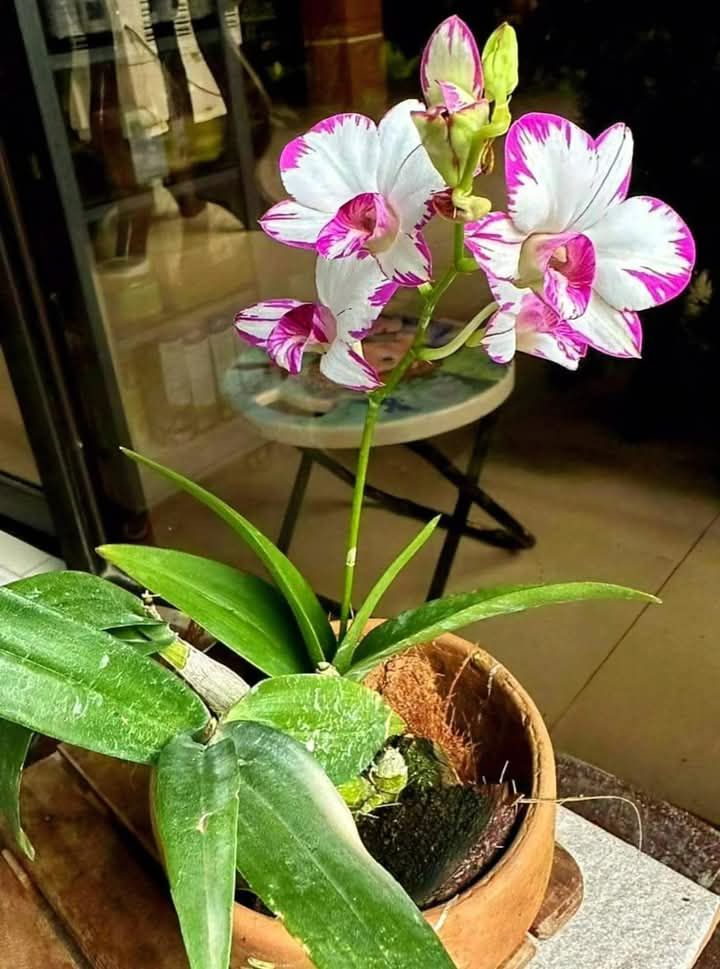The Dendrobium Miniature Enobi is a captivating orchid that brings beauty, elegance, and vibrant colors to any space. Known for its delicate flowers with white, pink, and purple hues, this miniature orchid offers a stunning display that is perfect for collectors and plant lovers who want to add a splash of color to smaller areas. Its compact size makes it ideal for small indoor gardens, tabletops, or as a statement plant in any room.
Benefits of Growing Dendrobium Miniature Enobi
Aesthetic Appeal: With its delicate blooms in shades of white, pink, and purple, the Dendrobium Miniature Enobi adds a touch of luxury and sophistication to any room. Its vibrant flowers make it a focal point in small spaces, and its compact size ensures it can be placed almost anywhere.
Air Purification: Like many orchids, the Dendrobium species is known for its ability to purify the air, helping to improve the air quality in your home. Orchids absorb pollutants and release oxygen, making them an excellent choice for indoor environments.
Symbol of Love and Strength: In folklore, orchids symbolize love, strength, and luxury. The Dendrobium species is often associated with endurance and beauty, making it a meaningful gift or addition to your home.
Space-Friendly: Because of its miniature size, this orchid is a great choice for those with limited space. Whether you live in an apartment or have a small office, the Dendrobium Miniature Enobi thrives in compact settings.
How to Care for Dendrobium Miniature Enobi
Despite its delicate appearance, the Dendrobium Miniature Enobi is relatively easy to care for when you understand its basic needs. Here’s how to keep it healthy and blooming beautifully:
1. Light Requirements
The Dendrobium Miniature Enobi thrives in bright, indirect light. It’s essential to avoid placing the orchid in direct sunlight, as the harsh rays can scorch the leaves and flowers. A north- or east-facing window is ideal for this orchid, providing ample light without the intensity of midday sun.
While this orchid can tolerate some morning or late afternoon direct sunlight, it’s best to shield it from the harsh midday sun, as this can damage its delicate blooms. If you don’t have access to natural light, consider using a grow light to ensure your orchid receives the appropriate amount of light for optimal growth.
2. Temperature and Humidity
The Dendrobium Miniature Enobi thrives in temperatures between 65–80°F (18–27°C), which mimics its natural tropical environment. Ensure that your orchid is not exposed to sudden temperature fluctuations or cold drafts, which can negatively impact its health.
Additionally, this orchid prefers high humidity levels. While it can tolerate average indoor humidity, it will flourish in a more humid environment. To increase the humidity, you can:
Place the orchid on a humidity tray with pebbles and water (making sure the pot isn’t sitting directly in the water).
Use a humidifier to maintain moisture in the air.
Group plants together to create a more humid microclimate.
If the air in your home is too dry, especially during the winter months, these methods can help keep your orchid comfortable.
3. Watering
One of the most crucial aspects of caring for a Dendrobium Miniature Enobi is proper watering. Overwatering is a common mistake with orchids, leading to root rot and other issues. To avoid this, water your orchid only when the potting medium feels dry. A good rule of thumb is to let the roots dry slightly between waterings.
When you water, ensure that the water drains through the pot, and avoid letting the orchid sit in standing water. It’s important to use well-draining orchid mix to ensure that the roots don’t remain waterlogged. If the roots stay too wet for too long, they can become susceptible to rot.
4. Fertilization
The Dendrobium Miniature Enobi benefits from regular fertilization to support its growth and blooming cycles. Use a balanced orchid fertilizer, applying it once a month during the growing season (spring and summer). This helps provide the nutrients needed for healthy growth and beautiful flowers.
During the dormant season (fall and winter), you can reduce fertilization or stop entirely. Orchids don’t require as much food during their resting period, and overfertilizing can harm the plant.
5. Pruning and Deadheading
After your orchid has finished blooming, it’s a good idea to remove any spent flowers to encourage new growth. You can trim the flower spike back to just above the node (a small bump on the stem). If the entire spike turns yellow or brown, it’s best to cut it all the way back to the base.
While pruning isn’t necessary for the plant’s health, it can help maintain the plant’s appearance and encourage fresh growth. Additionally, removing dead or damaged leaves keeps the orchid looking tidy.
6. Repotting
Orchids generally need to be repotted every 2-3 years or when the potting medium starts to break down. It’s best to repot your Dendrobium Miniature Enobi in the spring, just before its growing season begins. Choose a slightly larger pot with good drainage and use a fresh orchid mix to provide the best environment for the roots to thrive.
When repotting, be gentle with the roots to avoid damaging them. After repotting, water the orchid thoroughly and allow the potting mix to settle around the roots.
Common Problems and Solutions
Yellowing Leaves: This could be a sign of overwatering or too much direct sunlight. Ensure the orchid is in a bright, indirect light location and that it is not sitting in water.
No Blooms: If your Dendrobium Miniature Enobi isn’t blooming, it might be a sign of inadequate light or a need for a period of dormancy. Ensure that it’s getting enough light, and consider reducing watering and fertilization during the winter months.
Pests: Orchids are relatively pest-resistant, but they can still fall prey to mealybugs, aphids, or spider mites. Inspect your plant regularly and treat any infestations with an insecticidal soap or neem oil solution.
Safety Considerations
The Dendrobium Miniature Enobi is non-toxic to pets and humans, making it a safe choice for homes with curious pets or young children. However, as with any plant, it’s always a good idea to prevent pets from nibbling on the leaves or flowers.
Conclusion
The Dendrobium Miniature Enobi is a perfect addition to any indoor garden, offering vibrant color, beauty, and elegance in a compact form. With proper care, this orchid can thrive for years, producing stunning blooms that will brighten up any space. Whether you’re an orchid enthusiast or just looking for a low-maintenance plant to bring beauty to your home, the Dendrobium Miniature Enobi will not disappoint.
By following the essential care tips outlined here, you can enjoy the elegance and charm of this miniature orchid, while also purifying the air and adding a touch of luxury to your home or office.
More Articles You Might Like
-
Texas Toast Sloppy Joes: The Crunchy, Cheesy Upgrade You Didn’t Know You Needed
There’s something timeless about sloppy joes. For generations, this saucy, savory, and slightly sweet ground beef sandwich has been a go-to comfort food in American kitchens. It’s quick, filling, and family-friendly—perfect for busy weeknights. But what if we told you there’s a way to take this classic dish up a notch? Enter the Texas Toast…
-
Classic Pig Pickin’ Cake
When it comes to Southern desserts, few sweets shine as brightly as the Classic Pig Pickin’ Cake. This nostalgic cake, sometimes called a “Mandarin Orange Cake,” has roots deep in Southern tradition. It gets its playful name from its frequent appearance at pig pickin’s—Southern-style barbecue gatherings where communities come together to enjoy slow-cooked pork, sides,…
-
Lemon Garlic Butter Chicken with Creamy Parmesan Pasta
There’s something irresistible about the combination of tender, golden-browned chicken paired with a creamy pasta coated in Parmesan cheese. Add the brightness of lemon, the depth of garlic, and the richness of butter, and you have a recipe that feels indulgent yet approachable enough for a weeknight dinner. Lemon Garlic Butter Chicken with Creamy Parmesan…



